The incense industry is an integral part of Sudanese cultural heritage. Its roots extend back to a long history extending across African and Eastern civilizations intertwined in Sudan. The industry goes beyond the simple idea of a local product to become part of the heritage and cultural identity passed down through generations, always present in social rituals and traditional celebrations.
In Sudan, the incense industry is a living heritage, combining local natural materials and the traditional craft that carefully extracts and collects the ingredients. The aromatic materials come from multiple sources, including local plants, natural aromatic oils, and Parisian perfumes that have become a major part of the aromatic components of the Sudanese community. Despite the successive crises that Sudan has gone through, women still practice this traditional craft and continue to preserve the traditions of this industry, in defiance of the difficult conditions that are sweeping the country.
Talking about the incense industry in the context of war is a documentation of the historical path local communities took in preserving cultural heritage, in addition to celebrating the efforts of manufacturers to rise during the conflict that directly harmed the Sudanese industry.
From a Hobby to a Thriving Business
"In the month prior to the outbreak of war, I had come close to achieving my most important ambitions; introducing Sudanese incense and perfumes into the duty-free market at Khartoum International Airport and sales of local airlines, including Badr Airlines, and before my dream could complete its final steps, but the war cut off the road in front of it," says Hind Salah El-Din, founder of the "Umm Al-Fadil Perfumes and Incense" brand.
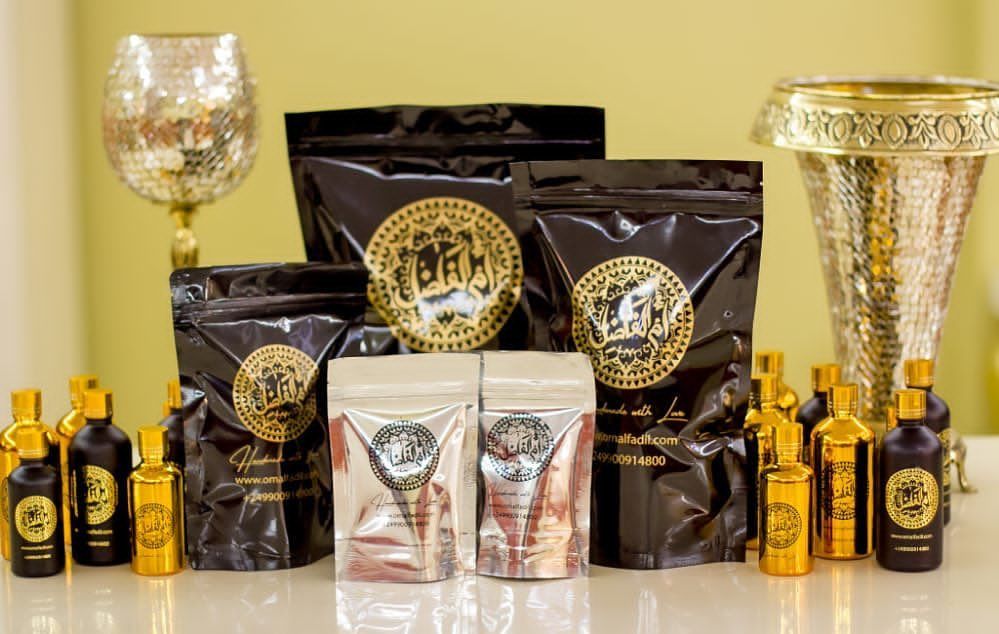
Some of Umm Al-Fadil products - photo courtesy of Umm A-Fadil on Instagram
Sandalwood incense (made from sandalwood), which is the most expensive and most famous and symbolizes prosperity, is used on special occasions such as marriage in the Jirtig or wudu’a (birth-giving) rituals. Other types are made from shaf, talh, anfar, and adeni woods, all of which are local plants and used in homes regularly, and accompany traditional Sudanese coffee sessions to show welcome and generosity.
In my conversation with Hind, she began by describing her love for Sudanese incense and perfumes, which prompted her to learn how to make incense as part of her normal life routine. However, the women in her family encouraged her to start using her talent in making incense as an additional source of income. “I was an ordinary housewife, until a number of my relatives told me to start a small project to sell incense, because I always used to give incense to relatives and friends and always give them incense that I made with my own hands,” Hind said, recalling the inspiration and motivation to start her brand.
Hind faced many hardships to create a place for her product in the Sudanese market and create a loyal and permanent customer base in the face of successive crises. The beginning was not smooth, as it coincided with the beginning of the spread of the Corona virus pandemic, the political and economic volatility that the country went through during the revolution and in the period that followed it, and finally, the war currently raging in Sudan. Although the incense industry was not immune to the successive crises that cast their shadows on various sectors in Sudan even before the outbreak of the war, but its outbreak caused the economy to collapse rapidly, and with it, the dreams of producers and creators who sought to preserve the heritage and transfer it to the world.
Cultural and Material Support
Omaima Zain Al-Abidin, founder of "Sanad for Incense and Perfumes", was working to redefine the concept of Sudanese perfumes and incense, as she began to create some Sudanese perfume blends and add flavors inspired by Parisian perfumes to her blends through her brand, to match the requirements of the current market. While "Sanad" faces the challenge of selling a traditional Sudanese product in a different country and attracting consumers from various backgrounds, she decided to renew the look of her products. “I added small and elegant packages that suit the external market. The new package size is 50 ml only, while in Sudan we consume 500 ml packages or more. I wanted to give the consumer the right to try at least,” says Omaima. The idea of reducing the size of the packages was not limited to Omaima alone, as Hind shared the same experience for different reasons.
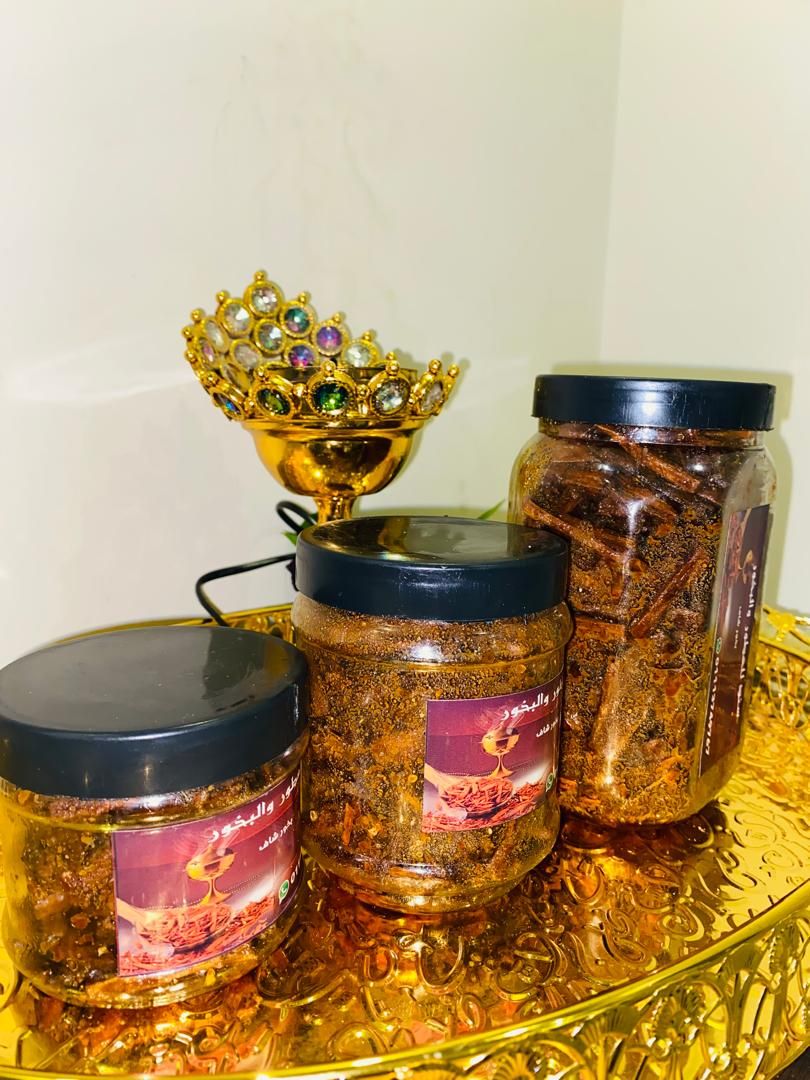
Some of Sanad products - Photo Courtesy of Omaima
Hind was surprised on her last return to Sudan to buy raw materials by the new prices for the products, and before thinking about changing the prices of her products, she had decided to sell smaller quantities at a lower price. “My smallest product is 20 ml and I called it Al-Natsha, because it is very small, but the economic situation has become very bad. I do not know how customers will bear these costs. I feel a pang of sadness whenever I think about doubling the prices, as I know very well how the Sudanese society ended up financially in the aftermath of the war.” Despite this trend towards the outside world imposed by the war that displaced millions of Sudanese, neither Hind nor Omaima abandoned the authenticity of their products. For Omaima, the biggest challenge was to remain faithful to the roots of Sudanese industry while maintaining the use of raw materials with known specifications of the fragrance of Sandalwood and Parisian perfumes. They also faced the challenges of making elegant perfume bottles that travel with memories, while drawing the features of a generation of creative women who have transformed the challenges of war into gateways to renewal and survival.
Perfume and Incense Making: Heritage and Private Spaces
Historically, this craft has been associated with social occasions such as marriage, childbirth, and circumcision. At a time when Sudanese women did not know many public spaces that gave them freedom of meeting and expression, incense-making sessions provided a spacious outlet for women whose roles focused on care work. Spaces where women gather, such as the Jabana (coffee) sessions, incense making, perfumes, and other traditional cosmetics, and the Zar, represent private spaces where women huddle away from the burdens of their daily lives. These spaces provide intimate rituals in which women can practice their crafts and share their thoughts, secrets, and different feelings towards life, which represents a bridge for communication between women across generations.
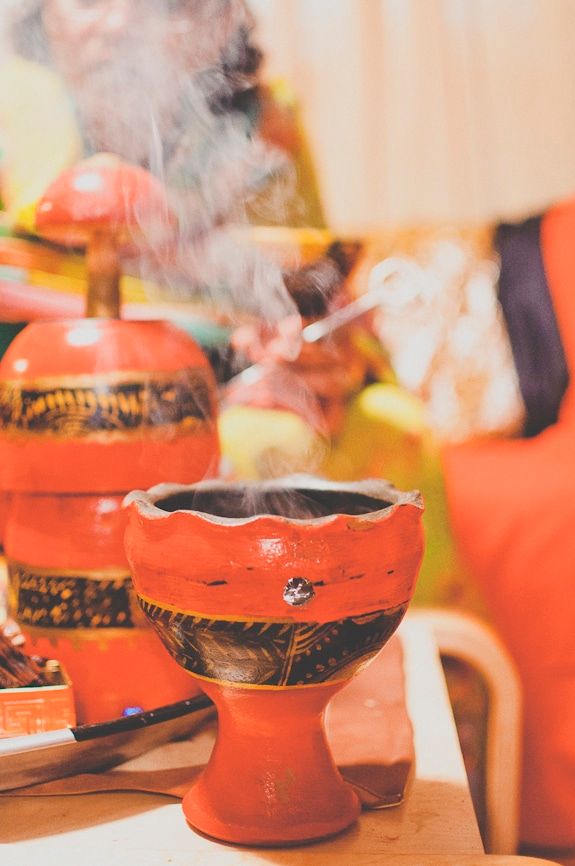
Incense burning in a Sudanese Jertiq incense burner - Photo courtesy of Capitol Romance
On another level, the Sudanese incense and perfume industry represented a basic livelihood for many women, especially those who did not find opportunities in the organized labor market. Away from the shops and complex marketing plans, production relied heavily on individual skill and reputation. These home-based industries succeeded in creating spaces of opportunity and creativity for women, making incense and perfumes not only a symbol of cultural heritage but also a means of empowering women economically and socially. Hind Salah recounts her sister’s support, saying: “My sister helped me make incense in Sudan, but she worked in an office job with a modest salary. “I offered her double the salary she received from her previous job, on the condition that she devote herself to helping me make incense because I am now producing larger quantities due to the increased demand.”
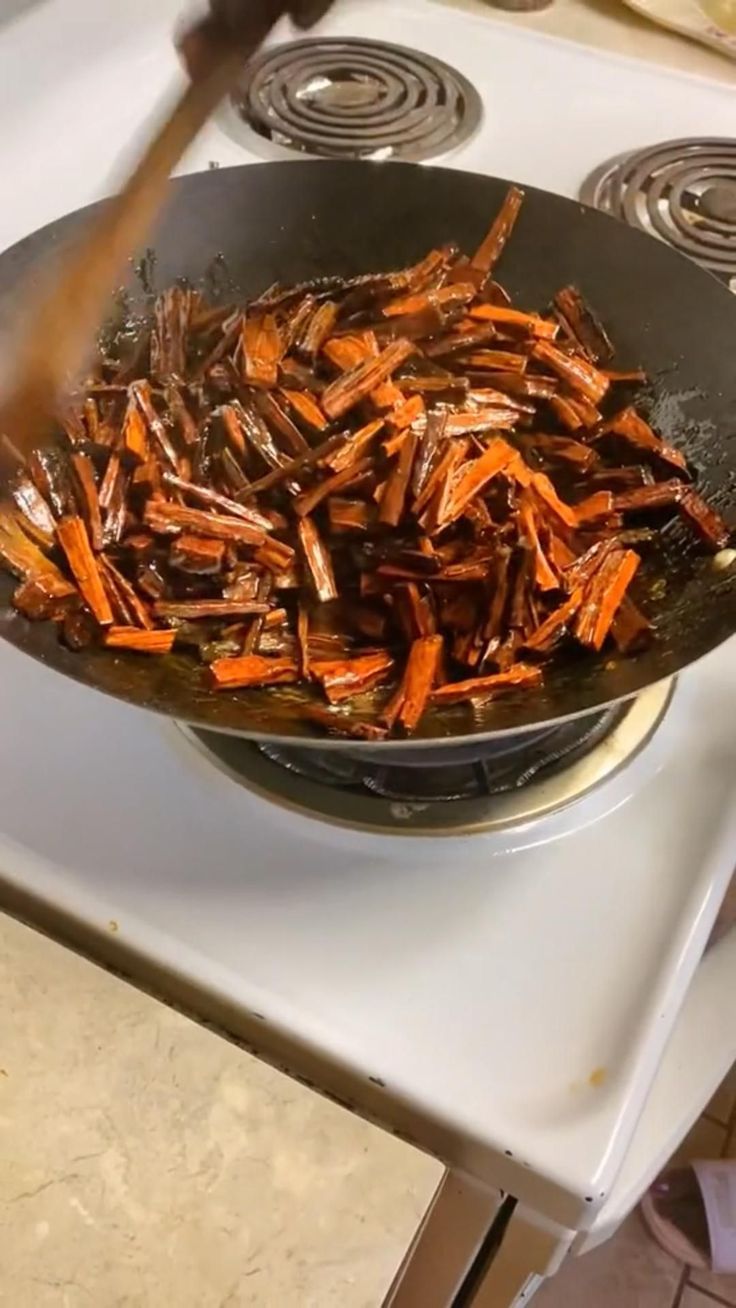
Bukhor making. Photo courtesy of MAJIN BU(˶˃ ᵕ ˂˶)
In Return, New Challenges
The war has cast its devastating shadow over every area. After forcing millions to leave their homes in search of a haven, the war has left various industries in a state of complete paralysis. As the war approaches its second year, brands are embarking on an arduous journey to return to life, both inside and outside Sudan. While the remaining brands in Sudan are putting themselves in a dangerous position, as there are no guarantees for the safety of the states that have not yet been affected by the conflict, the challenges facing incense makers do not stop at the crisis of alienation and the absence of the traditional market only; the exorbitant prices combined with the collapse of purchasing power have burdened producers.
Hind Salah recounts, "In 2020, I moved with my children to the States, I started selling incense in Virginia, but I would return to Sudan before my last batch of incense was finished to make a new batch in Sudan. Sure, I could make incense here in the United States, but I missed the ritual of making incense in Al-Haishan (backyards) with my family and friends. I can’t make it without that atmosphere and I don’t think the incense would maintain the same quality without it.”
Hind shared her experience with the war crises, saying: “Unfortunately, the high prices in Sudan have disrupted my work for a long time. Recently, I bought a bag of shaf wood for $300, and its last price before the war in Sudan was $20. I know that several women are preparing to get married in Egypt, where a large number of middle-class Sudanese have sought refuge. I had to design a new package for brides for 10,000 Egyptian pounds because I am very sympathetic to the situation of women who will be deprived of their joy as Sudanese brides at least once in their lives.”
For Omaima, the incense industry took a completely different direction, as she started her project after the outbreak of the conflict in Sudan for economic reasons. Omaima has been practicing this craft for years, making her own incense for personal use or to give as gifts, but the war pushed her to turn what she inherited from her mother into a primary source of income. Omaima and her family resettled in Egypt, and there was an urgent need to invent a new way to help them cope with life in exile.
Naturally, the beginning was not easy, as launching a Sudanese brand in a country of immigration with different customs and cultures was a big challenge. However, with the migration of a large number of Sudanese to Egypt, Omaima was able to create a loyal consumer base for her products. For her, incense was not just a product to sell, but it was always an expression of identity and longing for the homeland. Omaima shared, “I have always sent incense to my son and his wife abroad. When the war broke out, I stopped sending it for a while. When I finally managed to send some incense to his family, his wife called me to thank me. She said that my son was very touched and could not talk to me because he was crying and saying that the incense reminded him of the smell of our home.” Omaima continued, “That moment affected me a lot. I hope that we can return to our homes and loved ones again.”
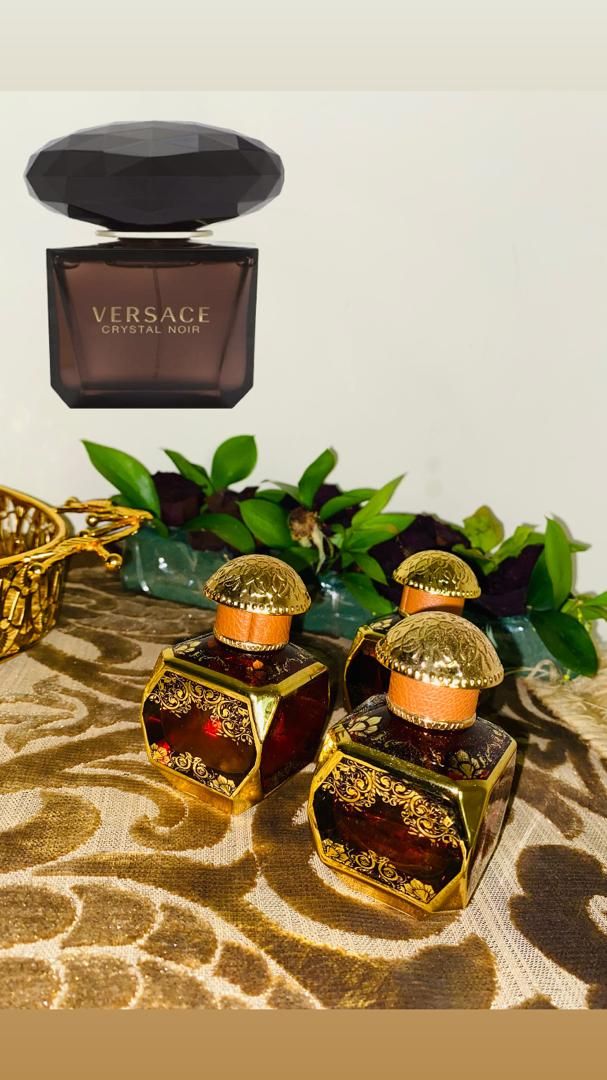
Some of Sanad's products. Photo Courtesy of Omaima
Cultural Heritage in the Face of Adversity
“The beginning was not easy for me, but I was able to work amid COVID-19, and I tried my best during the war. It is getting more difficult, and I hope that I will be able to cover the needs of Sudanese women in all countries.” Hind said. She worked hard to build a network of cooperation with representatives in several countries such as Saudi Arabia, Sudan, Egypt, and the Emirates, in addition to her headquarters in the United States. However, the expansion of the work was not challenge-free, as she added: “The difficulties increase according to the laws and conditions of each country.”
Talking about economic growth in Sudan today is a fantasy and a luxury when we consider the reality left by the war. When the fires of war in Sudan intensified, Hind Salah, founder of the “Umm Al Fadil Incense and Perfumes” brand, had no choice but to rearrange her plans. She aspired to fly with her brand in the spaces of global markets, starting with an exhibition in Paris, but things changed. She says: “When the war broke out, I was about to attend a major perfume exhibition, and I had started the steps to introduce my products to the duty-free market at Khartoum International Airport, but everything stopped suddenly.” What seemed like a paved path to globalization turned into a new journey that was like starting from scratch. Despite the harsh conditions and obstacles facing incense makers, many brands were able to return to work and keep up with the economic situation.
Meanwhile, new brands started their activities after the war broke out, and the obstacles were not a reason for their cessation. Omaima, who founded her brand after the war broke out, said: “The incense industry represented more than just a source of income for me. It is associated with memories of women in the family and home; we loved incense since we were young, we used it a lot and enjoyed making it with my mother and aunts before it became a source of livelihood for me and my family.” This insistence on continuing reflects the deep relationship between the incense industry and the cultural heritage associated with the makers and consumers, in addition to consolidating the cultural heritage threatened by the war to become a symbol of resistance and an economic opportunity in the face of the obstacles imposed by the difficult conditions in Sudan.
